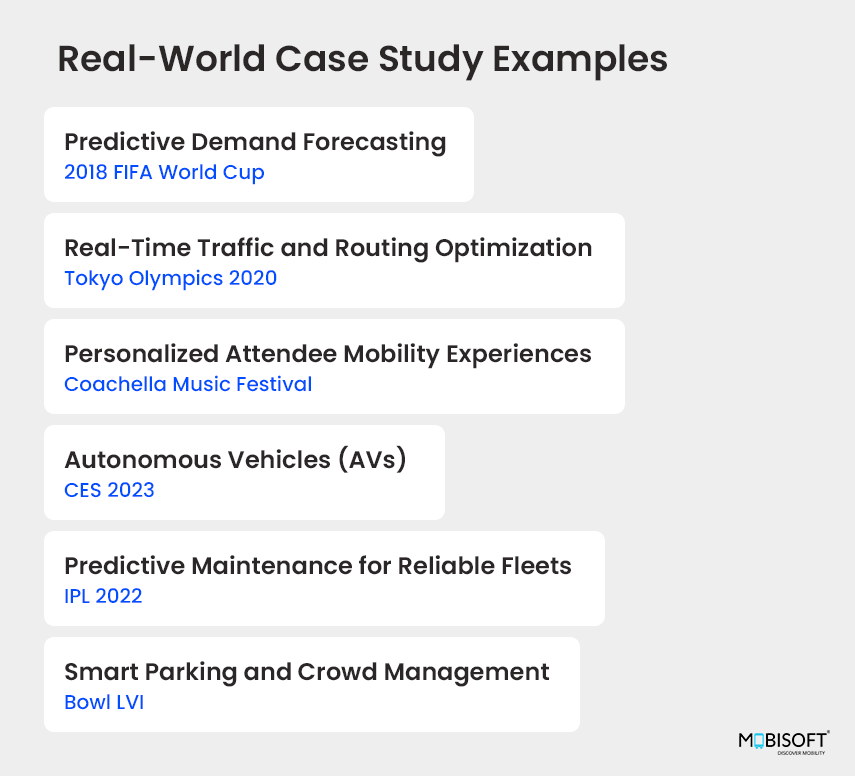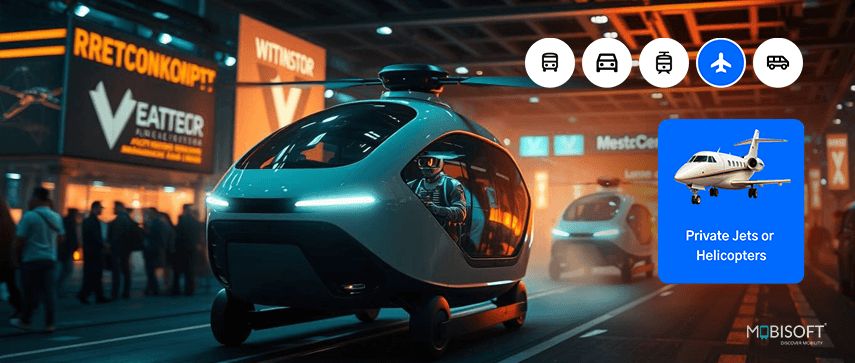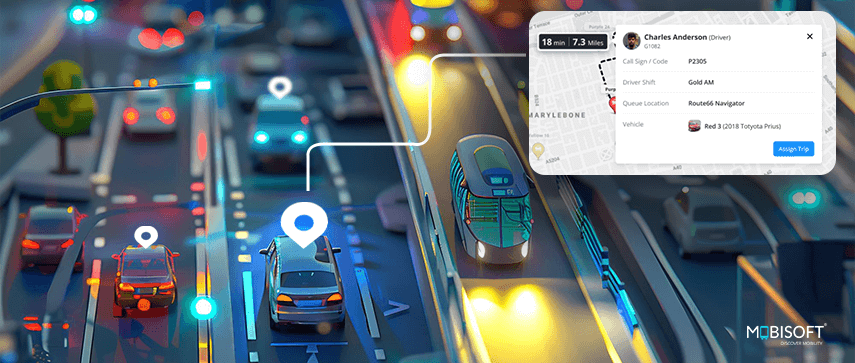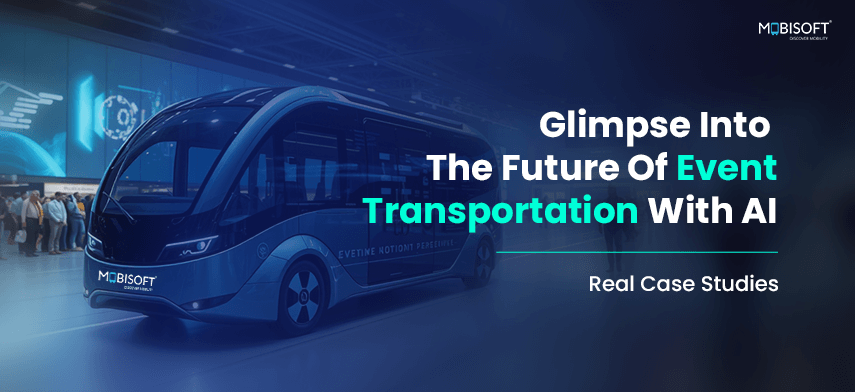Events—be it global sports tournaments, music festivals, or international expos—serve as hubs of human connection. However, behind the scenes lies a colossal logistical challenge: transporting thousands, sometimes millions, of attendees efficiently and seamlessly. Artificial Intelligence (AI) is emerging as a transformative force in this space, enabling smarter, safer, and more sustainable mobility experiences.
This blog delves into the role of AI in Event Transportation, supported by real-world examples and AI-powered transportation applications.
The State of Event Transportation: Challenges and Opportunities
Challenges in Traditional Event Transportation
- Complex Logistics: Coordinating multiple transport modes, vehicles, and schedules for diverse attendee groups is a monumental task. Event organizers must synchronize hundreds of vehicles across different service levels, from VIP limousines to mass transit shuttles. The complexity compounds when dealing with international events where multiple languages, time zones, and cultural preferences need consideration. Managing driver assignments, vehicle maintenance schedules, and backup resources adds another layer of intricacy to the operation.
- Real-Time Uncertainty: Traffic congestion, weather conditions, and last-minute changes often derail plans. Sudden road closures, accidents, or severe weather can force complete route restructuring within minutes. Event schedule changes, such as extended sessions or early conclusions, require immediate transportation plan adjustments. Traditional systems lack the agility to respond effectively to these dynamic situations, often resulting in cascading delays. This challenge highlights the need for AI-driven Event Transportation Solutions.
- Resource Wastage: Inefficient fleet allocation leads to empty rides, higher costs, and environmental impact. Without precise demand prediction, vehicles often run empty or below capacity during off-peak hours while being insufficient during rush periods. Manual scheduling systems struggle to optimize vehicle deployment across multiple pickup points and routes. This inefficiency not only increases operational costs but also contributes to unnecessary carbon emissions. AI in Event Logistics can help optimize fleet allocation and minimize resource wastage.
- Lack of Personalization: Attendees often face generic, one-size-fits-all transportation solutions, causing inconvenience. Different attendee groups - from VIPs to general participants - have varying needs and expectations for their transportation experience. Traditional systems cannot effectively track and accommodate individual preferences for vehicle types, routes, or special requirements. The inability to provide personalized service often results in reduced attendee satisfaction and increased complaints. AI-powered Event Transportation offers customized experiences, enhancing the attendee journey.
- Communication Gaps: Traditional event transportation suffers from fragmented communication channels between organizers, drivers, and attendees. Critical updates about delays or route changes often fail to reach all stakeholders in time. The lack of a unified communication platform leads to confusion and miscoordination, especially during large-scale events with multiple simultaneous operations.
Opportunity:
AI technologies can address these pain points, making event transportation smarter, more dynamic, and attendee-centric. Advanced algorithms can process complex logistics in real time, adapting to changes while maintaining service quality. Machine learning models can analyze patterns to optimize resource allocation and predict potential issues before they occur. AI-powered platforms can deliver personalized experiences while maintaining operational efficiency at scale. This technological transformation promises not just improved operations but a fundamental reimagining of event transportation management.

How AI is Transforming Event Transportation

1. Predictive Demand Forecasting: Ensuring Preparedness
AI-driven models analyze historical data, ticket sales, social media buzz, and regional trends to forecast transportation needs. Our system processes multiple data streams simultaneously, creating actionable insights for event organizers.
Example:
At the 2018 FIFA World Cup, AI models revolutionized event transportation management by:
- Analyzing ticket sales data and travel patterns in real time to predict peak transportation demands.
- Processing multiple data points including match schedules, team progression, and fan movement patterns.
- Enabling organizers to allocate additional buses during critical times based on precise demand forecasting.
- Adjusting predictions based on real-time stadium entry data and crowd flow patterns.
- Coordinating with local transportation authorities to manage surge capacity.
Impact:
Impact and Results:
- Operational Improvements:
- Optimized fleet size and schedules based on accurate demand predictions
- Reduced operational costs through efficient resource allocation
- Minimized attendee frustrations with shorter wait times
- Enhanced overall event experience through smoother transportation flow
- Resource Optimization:
- Precise vehicle deployment during peak hours
- Efficient driver scheduling
- Reduced empty vehicle runs
- Optimal route planning
This successful implementation demonstrated how AI-powered predictive analytics can transform large-scale event transportation management, setting new standards for future global sporting events.
2. Real-Time Traffic and Routing Optimization
AI-powered navigation tools adapt to live traffic updates, weather alerts, and crowd movements to suggest optimal routes. Our systems process complex traffic data in milliseconds to make intelligent routing decisions that keep events running smoothly.
Example:
During the Tokyo Olympics 2020, AI systems demonstrated advanced traffic management capabilities by:
- Redirecting shuttles in real-time to bypass traffic bottlenecks caused by increased footfall near stadiums.
- Processing live crowd movement data to predict and avoid potential congestion points.
- Continuously updating attendee apps with accurate arrival times and alternate pickup points.
- Coordinating with local traffic systems to optimize flow around venues.
- Maintaining communication between drivers, passengers, and control centers.
Impact:
- Transportation Efficiency:
- Faster transit times for attendees
- Minimized disruption to event schedules
- Reduced congestion around venues
- Improved passenger experience
- Enhanced operational control
This implementation showcased how AI-powered routing optimization can transform event transportation, ensuring smooth operations even during one of the world's biggest sporting events.
3. Personalized Attendee Mobility Experiences
AI customizes the transportation experience based on attendee preferences, ensuring convenience and satisfaction. Our system creates unique transportation profiles for different attendee segments, delivering personalized service at scale.
Example:
At the Coachella Music Festival, AI-powered chatbots revolutionized the transportation experience by:
- Providing attendees with tailored travel options based on their ticket type and lodging locations.
- Delivering personalized notifications to VIP ticket holders about private shuttle availability.
- Guiding general admission users to optimal shared ride options.
- Coordinating pickup times based on individual show schedules.
- Managing transportation preferences for different audience segments.
Impact:
- Enhanced Experience:
- Enhanced attendee engagement through personalized service
- Streamlined transportation for diverse audience segments
- Improved customer satisfaction levels
- Reduced wait times
- Better resource utilization
This implementation demonstrated how AI-powered personalization can transform event transportation from a one-size-fits-all service to a tailored experience that meets the unique needs of different attendee segments.
4. Autonomous Vehicles (AVs): The Future of Event Transport
AI-powered autonomous vehicles (AVs) are redefining mobility, providing a futuristic, efficient, and eco-friendly mode of transportation. These systems represent a paradigm shift in event transportation technology, combining advanced AI with electric vehicle technology.
Example:
At CES 2023, autonomous shuttles demonstrated next-generation transportation capabilities by:
- Ferrying attendees seamlessly between venues, hotels, and parking areas.
- Navigating complex traffic patterns independently using AI algorithms.
- Processing real-time environmental data for optimal routing.
- Coordinating with venue management systems for efficient passenger flow.
- Maintaining continuous communication with control centers.
Impact:
- Operational Excellence:
- Reduced reliance on human drivers
- Significant cost savings over time
- Enhanced safety with fewer human errors
- Improved service consistency
- Greater operational efficiency
This implementation showcased how autonomous vehicles and AI-driven transportation solutions can transform event transportation, setting new standards for safety, efficiency, and sustainability in passenger movement at large-scale events.
5. Predictive Maintenance for Reliable Fleets
AI systems monitor vehicles for wear and tear, predicting maintenance needs before breakdowns occur. These predictive systems analyze multiple data points to ensure fleet reliability during critical event periods.
Example:
During IPL 2022, AI-powered diagnostics transformed fleet maintenance by:
- Flagging potential mechanical issues in event shuttles before they became critical.
- Scheduling preemptive maintenance during identified off-peak hours.
- Coordinating with maintenance teams for efficient service delivery.
- Tracking vehicle performance metrics in real-time.
- Maintaining optimal fleet availability during match days.
Impact:
- Service Excellence:
- Fewer service interruptions during events
- Lower maintenance costs through prevention
- Increased attendee trust in transportation services
- Extended vehicle service life
- Optimized maintenance scheduling
This implementation demonstrated how AI-powered predictive maintenance can ensure reliable event transportation services during high-stakes sporting events, where vehicle availability is crucial for success.
6. Smart Parking and Crowd Management
AI optimizes parking spaces and crowd flow to minimize congestion near event venues. These intelligent systems coordinate multiple aspects of venue access to ensure smooth operations during peak periods.
Example:
During Super Bowl LVI, AI-driven parking systems revolutionized venue access by:
- Guiding attendees to available parking spaces in real-time via smartphone integration.
- Managing traffic flow patterns around the stadium to reduce congestion.
- Coordinating with local traffic systems for optimal access routes.
- Providing dynamic updates on space availability and alternative options.
- Monitoring and responding to crowd density patterns.
Impact:
- Operational Efficiency:
- Faster parking and smoother traffic flow
- Improved attendee experiences from arrival to departure
- Reduced venue access time
- Enhanced security management
- Better resource utilization
This implementation showcased how AI-powered parking and crowd management systems can transform the event transportation experience at major sporting events, significantly reducing congestion and improving overall event access.
Sustainability Meets AI in Event Transportation

Sustainability is no longer optional—it's a necessity. AI plays a pivotal role in reducing the environmental impact of event transportation through intelligent optimization and resource management.
AI-Driven Sustainable Practices
Shorter, optimized routes minimize fuel consumption and emissions through advanced AI algorithms and real-time adaptation.
Real-World Example: COP26 Climate Summit
The AI-powered shuttle system demonstrated environmental leadership by:
- Reducing fuel use by 20% through dynamic route adjustments.
- Processing real-time traffic patterns for optimal routing.
- Minimizing idle time and unnecessary detours.
- Coordinating multiple vehicles for maximum efficiency.
- Tracking and reporting emissions data in real-time.
Shared Mobility Solutions
AI systems manage charging schedules and optimize battery usage for electric vehicles, ensuring maximum efficiency during events.
Real-World Example: Glastonbury Festival
The shared mobility system achieved significant environmental impact by:
- Reducing total vehicle trips by 40% compared to previous years.
- Coordinating shared rides based on attendee locations and schedules.
- Optimizing vehicle capacity utilization.
- Managing dynamic pickup and drop-off points.
- Tracking and reporting carbon reduction metrics.
Electric Fleet Integration
AI systems manage charging schedules and optimize battery usage for electric vehicles, ensuring maximum efficiency during events.
Real-World Example: Expo 2020 Dubai
The AI-managed electric shuttle system demonstrated sustainable transportation excellence by:
- Transporting over 1.5 million attendees with zero emissions.
- Managing charging schedules for optimal fleet availability.
- Monitoring battery performance and range.
- Coordinating power grid load distribution.
- Maximizing renewable energy usage.
These implementations showcase how AI-driven sustainability initiatives can transform event transportation, setting new standards for environmental responsibility in the industry.
The Business Case for AI in Event Transportation

For Event Organizers:
- Streamlined logistics save time and reduce costs: AI automation eliminates manual coordination tasks while reducing human error in scheduling and dispatch operations. The system optimizes resource allocation in real-time, reducing unnecessary vehicle deployments and idle time. Advanced analytics provide clear visibility into operational costs, helping identify areas for efficiency improvements.
- Positive attendee experiences increase retention and brand loyalty: Consistent, high-quality AI-powered transportation services enhance overall event perception and encourage repeat attendance. The system maintains detailed feedback and preference data, enabling continuous service improvement and personalization. Real-time communication channels ensure guests stay informed and confident about their transportation arrangements.
For Transportation Providers:
- Increased fleet utilization and efficiency: AI optimization reduces empty vehicle movements and improves overall fleet productivity. Smart routing and scheduling algorithms maximize vehicle availability during peak demand periods. The system provides detailed analytics on service performance and cost metrics, enabling data-driven operational decisions.
- Enhanced reputation through cutting-edge technology adoption: Implementation of AI-driven solutions demonstrates commitment to innovation and service excellence. Advanced features like real-time tracking and automated updates strengthen market positioning and competitive advantage. The ability to handle complex transportation requirements attracts high-profile events and clients.
For Attendees:
- Hassle-free, reliable transportation builds trust: Smart routing ensures consistent, on-time service while minimizing travel disruptions. The system provides real-time updates and alternative options during unexpected situations. Personalized service delivery creates a premium experience that meets individual preferences and needs.
- Sustainable options align with modern values: AI-optimized routes and electric vehicle integration demonstrate environmental responsibility. The system provides transparency about environmental impact and sustainable choices. Attendees can make informed decisions about their transportation options while supporting green initiatives.
Emerging Trends in AI-Powered Event Transportation

1. Drone-Based Mobility
AI-powered drones are being explored for VIP transfers and urgent deliveries at events, representing the next frontier in aerial transportation solutions.
Real-World Example: Burning Man Festival
The drone delivery system demonstrated innovative capabilities by:
- Transporting critical medical supplies across the vast event grounds.
- Navigating complex airspace with AI-powered flight paths.
- Maintaining continuous communication with ground control.
- Operating in challenging desert conditions.
- Providing rapid response for urgent delivery needs.
System Capabilities:
- Autonomous Operation:
- AI flight path optimization.
- Weather condition adaptation.
- Obstacle avoidance.
- Real-time route adjustment.
- Emergency response protocols.
2. Digital Twins for Scenario Planning
Digital twins simulate event transportation scenarios, helping organizers identify potential challenges and optimize plans before implementation.
Real-World Example: Formula 1 Monaco Grand Prix
The digital twin technology enhanced event planning by:
- Modeling crowd flow patterns for optimal vehicle operations.
- Simulating various traffic scenarios before race day.
- Testing different transportation strategies virtually.
- Identifying potential bottlenecks and congestion points.
- Optimizing resource allocation based on simulated data.
System Capabilities:
- Virtual Simulation:
- Real-time scenario testing.
- Predictive analytics.
- Resource optimization.
- Risk assessment.
- Performance monitoring.
3. Blockchain for Secure Access
Blockchain-enabled AI systems ensure secure ticketing and access control, eliminating fraud while streamlining operations.
Real-World Example: NBA Finals 2023
The blockchain integration revolutionized access control by:
- Verifying attendee identities through secure blockchain records.
- Managing shuttle access with tamper-proof digital passes.
- Coordinating transportation privileges across multiple venues.
- Preventing unauthorized access and ticket duplication.
- Maintaining secure transaction records.
System Capabilities:
- Security Features:
- Encrypted access control.
- Digital identity verification.
- Real-time validation.
- Fraud prevention.
- Secure data management.
This implementation of emerging technologies demonstrates how AI continues to evolve and enhance event transportation solutions, setting new standards for efficiency, security, and innovation in the industry.
Conclusion: The Future Awaits
AI is not just an enhancement—it's a revolution in event transportation. By integrating AI, event organizers can achieve unparalleled efficiency, attendees enjoy seamless experiences, and sustainability goals become attainable realities.
Transformative Impact:
- AI technology has fundamentally changed how events manage transportation logistics.
- Real-time adaptation and predictive capabilities ensure smooth operations.
- Sustainable practices are now achievable through intelligent optimization.
- Enhanced passenger experiences create lasting positive impressions.
- Data-driven insights enable continuous improvement.
Future Outlook: The integration of AI in event transportation continues to evolve, promising even more advanced capabilities:
- Next-generation autonomous vehicles for enhanced mobility.
- Advanced environmental impact reduction through smarter routing.
- Deeper integration with smart city infrastructure.
- Enhanced personalization through advanced AI algorithms.
- Seamless multi-modal transportation coordination.
Industry Leadership: At Mobisoft, the future of event transportation is being shaped through:
- Continuous innovation in AI-powered solutions.
- Focus on sustainable transportation practices.
- Commitment to enhancing attendee experiences.
- Advanced security and privacy protection.
- Scalable solutions for events of any size.
The transformation of event transportation through AI is not just about technology—it's about creating better, more sustainable, and more efficient ways to bring people together. Contact Mobisoft to explore how AI-powered transportation solutions can elevate your next event to new heights of success.
At Mobisoft Infotech, we’re at the forefront of AI-driven event transportation solutions. From predictive analytics to autonomous vehicle integration, we empower event organizers to reimagine mobility.Let’s create the future of transportation, one event at a time. Contact us to transform your next event into a seamless mobility experience!





 January 2, 2025
January 2, 2025


